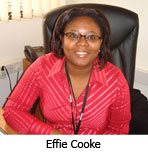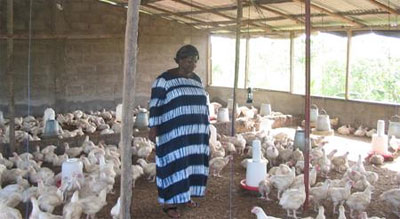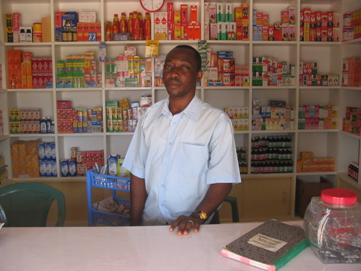Managing Opportunity

 How one Ghanaian returnee brought her professional skills home to promote wealth and enterprise
How one Ghanaian returnee brought her professional skills home to promote wealth and enterpriseWhen Effie Cooke returned to Ghana after 15 years of life in the UK, her biggest concern was how to build on the Human Resources Management expertise she had developed in London. Today Cooke is the head of Human Resources for Opportunity International Ghana, a leading micro-credit financial institution in Ghana. ReConnect Africa spoke to her about the challenges of returning home and the impact of her new role.
EC: Like most people, you get to a point where you feel that you have reached a ceiling in your career overseas. For me, it was about either changing direction in London or going back to Ghana. Although I have family there, it wasn’t the main factor. I really was just ready for change and I had to do something to break the monotony and it was a case of exploring opportunities where I was or going elsewhere. I looked at options in Ghana and found Opportunity International, which made going to Ghana the perfect solution.
EC: Primarily because of the work Opportunity is doing in Ghana in trying to help people who have the will to work but haven’t got access to credit to get a helping hand. It’s not just about the credit but about the added value where we offer a holistic approach by looking at the individual’s financial, social and spiritual transformation. This is a unique approach and one that I find very inspiring and exciting.
EC: The main thing is the difference in working culture that I developed in the UK. This was about being results driven and being accountable. This gives you the ability to take responsibility and ownership of what you do. The use of technology and exposure to new things there also helps you better. I think it’s mainly about developing a sense of responsibility and proving that you have the ability to deliver. Typically, in Ghana, you can expend a lot of effort without results and that’s what I find striking about the difference. There’s a different emphasis on productivity and accountability in my experience of working in the UK which has fed into my way of working and which I think has made me a more effective manager within the culture that I am now working.
EC: Opportunity International is the leading micro-finance institution in Ghana. We have about 48,000 clients and are probably the largest in terms of microfinance in Ghana.

EC: In many ways. We have clients now who are on their 10th loan cycle and have been borrowing from us for 8 years. Someone who started with one room now has a school; someone who had one chicken coop now has a poultry farm. These are people who once had very little and now have sustainable businesses and are also employing people. Our clients include market women selling plantain, tie and dye makers, school proprietors and farmers.

RCA: What was the toughest challenge in terms of making the transition back and settling into life in Ghana?
EC: For me, the key thing was to go in with a very open mind and to learn how things are done locally. To get buy-in from your colleagues, you shouldn’t be seen as someone who thinks how it is done abroad is how it should be at home. It’s about adapting your knowledge to what is on the ground. I think the most successful thing I have done is to use what I learned abroad to help manage change but to do it in the context of how things work in Ghana.
EC: For myself, I would say that the most important thing is to find the opportunity before you go. Looking for work locally can be very frustrating and if you don’t find something to do, you will give up. The important thing is to have something in place and that may mean travelling down periodically to get a feel of the country again and to find something. Otherwise, just packing up and going may be a problem. You should also understand that there is a local culture and, while you may want to institute changes, you can’t sweep that away and you have to work with the local culture.
Working in six African countries, Opportunity International is making a lasting difference in the lives of poor entrepreneurs - giving working capital, practical business training and principles for spiritual growth to thousands of entrepreneurs.
{mosimage}How one Ghanaian returnee brought her professional skills home to promote wealth and enterprise
When Effie Cooke returned to Ghana after 15 years of life in the UK, her biggest concern was how to build on the Human Resources Management expertise she had developed in London. Today Cooke is the head of Human Resources for Opportunity International Ghana, a leading micro-credit financial institution in Ghana. ReConnect Africa spoke to her about the challenges of returning home and the impact of her new role.
EC: Like most people, you get to a point where you feel that you have reached a ceiling in your career overseas. For me, it was about either changing direction in London or going back to Ghana. Although I have family there, it wasn’t the main factor. I really was just ready for change and I had to do something to break the monotony and it was a case of exploring opportunities where I was or going elsewhere. I looked at options in Ghana and found Opportunity International, which made going to Ghana the perfect solution.
EC: Primarily because of the work Opportunity is doing in Ghana in trying to help people who have the will to work but haven’t got access to credit to get a helping hand. It’s not just about the credit but about the added value where we offer a holistic approach by looking at the individual’s financial, social and spiritual transformation. This is a unique approach and one that I find very inspiring and exciting.
EC: The main thing is the difference in working culture that I developed in the UK. This was about being results driven and being accountable. This gives you the ability to take responsibility and ownership of what you do. The use of technology and exposure to new things there also helps you better. I think it’s mainly about developing a sense of responsibility and proving that you have the ability to deliver. Typically, in Ghana, you can expend a lot of effort without results and that’s what I find striking about the difference. There’s a different emphasis on productivity and accountability in my experience of working in the UK which has fed into my way of working and which I think has made me a more effective manager within the culture that I am now working.
RCA: What impact do you believe your organisation is making on promoting micro-enterprise development in Ghana?
EC: Opportunity International is the leading micro-finance institution in Ghana. We have about 48,000 clients and are probably the largest in terms of microfinance in Ghana.
EC: In many ways. We have clients now who are on their 10th loan cycle and have been borrowing from us for 8 years. Someone who started with one room now has a school; someone who had one chicken coop now has a poultry farm. These are people who once had very little and now have sustainable businesses and are also employing people. Our clients include market women selling plantain, tie and dye makers, school proprietors and farmers.
EC: For me, the key thing was to go in with a very open mind and to learn how things are done locally. To get buy-in from your colleagues, you shouldn’t be seen as someone who thinks how it is done abroad is how it should be at home. It’s about adapting your knowledge to what is on the ground. I think the most successful thing I have done is to use what I learned abroad to help manage change but to do it in the context of how things work in Ghana.
EC: For myself, I would say that the most important thing is to find the opportunity before you go. Looking for work locally can be very frustrating and if you don’t find something to do, you will give up. The important thing is to have something in place and that may mean travelling down periodically to get a feel of the country again and to find something. Otherwise, just packing up and going may be a problem. You should also understand that there is a local culture and, while you may want to institute changes, you can’t sweep that away and you have to work with the local culture.
Working in six African countries, Opportunity International is making a lasting difference in the lives of poor entrepreneurs - giving working capital, practical business training and principles for spiritual growth to thousands of entrepreneurs.
